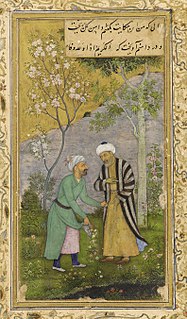 W
WAbū Nuwās al-Ḥasan ibn Hānī al-Ḥakamī was a classical Arabic poet. Born in the city of Ahvaz, in modern-day Iran, to an Arab father and a Persian mother, he became a master of all the contemporary genres of Arabic poetry. He also entered the folkloric tradition, appearing several times in One Thousand and One Nights. He died during the Great Abbasid Civil War before al-Ma’mūn advanced from Khurāsān in either 199 or 200 AH.
 W
WAhmad NikTalab was an Iranian poet, author, and linguist.
 W
WMirza Mohammad Nasir-al-Hosseini, better known by his pen name Forsat-od-Dowleh (فرصتالدوله), and more commonly Forsat-e Shirazi, was a poet, scholar and artist in Qajar Persia.
 W
WMahammad bin Suleyman, better known by his pen name Fuzuli, was an Azerbaijani, of the Bayat tribes of Oghuz, poet, writer and thinker. Often considered one of the greatest contributors to the divan tradition of Azerbaijani literature, Fuzuli in fact wrote his collected poems (divan) in three different languages: in his native Azerbaijani, Arabic and Persian. He was well-versed in both the Ottoman and Chagatai Turkic literary traditions as well as mathematics and astronomy.
 W
WKhwāja Shams-ud-Dīn Muḥammad Ḥāfeẓ-e Shīrāzī, known by his pen name Hafez and as "Hafiz", was a Persian poet, whose collected works are regarded by many Iranians as a pinnacle of Persian literature. His works are often found in the homes of people in the Persian-speaking world, who learn his poems by heart and still use them as proverbs and sayings. His life and poems have become the subjects of much analysis, commentary and interpretation, influencing post-14th century Persian writing more than any other author.
 W
WRezā Qoli Khān Hedāyat was a Persian writer and poet, and tutor of Mozaffar al-Din Shah Qajar.
 W
WMansour Hedayati was an Iranian poet, author, social critic from Mazandaran Province. He mostly wrote naturalistic, social and critical poems in Persian and Mazandarani Language. Some of his poems have been published in some native journals and magazines.
 W
WSheikh Jamal-ud-Din Ahmad was a direct descendant of Imam Abu Hanifa, the renowned Sunni-Persian jurist of Islam. He was born at Ghazni, (Khorasan) which is in Modern-day Afghanistan, in 583 A.H.. He was five years old when his family came to Hansi. He became a disciple of Baba Fariduddin Ganjshakar at the age of 50. He learnt deeply and served devotedly.
 W
WKhanzada Mirza Khan Abdul Rahim Khan-i-Khanan, popularly known as simply Rahim, was a poet who lived in India during the rule of Mughal emperor Akbar, who was his mentor, also. He was one of the nine important ministers (dewan) in his court, also known as the Navaratnas. Rahim is known for his Hindi dohe (couplets) and his books on astrology. The village of Khan Khana, which is named after him, is located in the Nawanshahr district of the state of Punjab, India.
 W
WOmar Khayyam was a Persian mathematician, astronomer, philosopher, and poet. He was born in Nishabur, in northeastern Iran, and spent most of his life near the court of the Karakhanid and Seljuq rulers in the period which witnessed the First Crusade.
 W
WNalî, also known as Mallah Xidir Ehmed Şawaysî Mîkayalî, was born in Khakoo Khol, a village of Sulaymani province. He was a Kurdish polymath; a poet, linguist, translator and mathematician, who is considered to be one of the greatest Kurdish poets in the Kurdish classical period.
 W
WShāh Nimatullāh or Shāh Ni'matullāh Wali,, also spelled as Ne'matollah and Ni'matallah was a Persian Sufi Master and poet from the 14th and 15th centuries. He is revered by Sunni Islam as a saint and by the Ni'matullāhī tariqa, who consider him their founder.
 W
WAbū-Muhammad Muslih al-Dīn bin Abdallāh Shīrāzī, better known by his pen name Saadi, also known as Saadi of Shiraz, was a major Persian poet and prose writer of the medieval period. He is recognized for the quality of his writings and for the depth of his social and moral thoughts. Saadi is widely recognized as one of the greatest poets of the classical literary tradition, earning him the nickname "Master of Speech" or simply "Master" among Persian scholars. He has been quoted in the Western traditions as well. Bustan has been ranked as one of the 100 greatest books of all time by The Guardian.
 W
WFatemeh Shams, also known as Shahrzad F. Shams is a contemporary Persian poet, translator and literary scholar, currently based in Philadelphia, Pennsylvania and teaching Persian literature at the University of Pennsylvania. She previously taught Persian literature and language at Oxford University, Courtauld Institute of Art, Somerset House, and School of Oriental and African Studies in London, UK.
 W
WQotb al-Din Mahmoud b. Zia al-Din Mas'ud b. Mosleh Shirazi (1236–1311) was a 13th-century Iranian polymath and poet who made contributions to astronomy, mathematics, medicine, physics, music theory, philosophy and Sufism.
 W
WReza Shirmarz, is a Greece-based published and awarded playwright, translator, researcher, theatre director and essayist with more than 30 books both written and translated by him, collaborating with major publishing companies, theaters, drama schools, radio channels, journals, etc. in Iran. Reza Shirmarz was elected as a member of the board of directors of Iran's Playwrights Guild for 3 ongoing years. He has been a professional member of bodies such as Iran's Playwrights Guild, Pen America and Dramatists Guild of America. He also is a language specialist and a full member of Chartered Institute of Linguists (CIOL) in London.
 W
WTahereh (Tāhirih) (Persian: طاهره, "The Pure One," also called Qurrat al-ʿAyn are both titles of Fatimah Baraghani/Umm-i-Salmih, an influential poet, women's right activist and theologian of the Bábí faith in Iran. She was one of the Letters of the Living, the first group of followers of the Báb. Her life, influence and execution made her a key figure of the religion. The daughter of Muhammad Salih Baraghani, she was born into one of the most prominent families of her time. Táhirih led a radical interpretation that, though it split the Babi community, wedded messianism with Bábism.